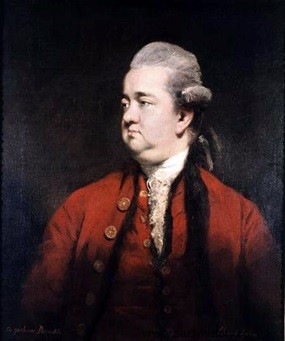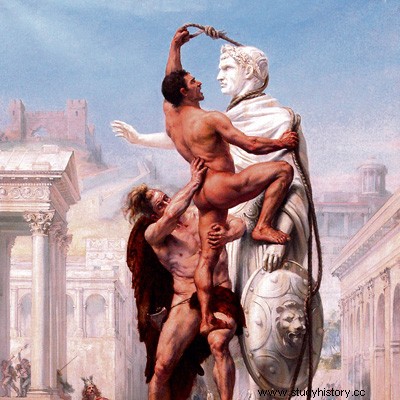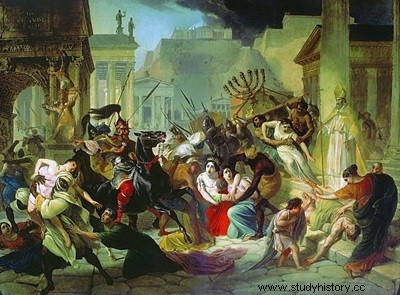 Rarely in modern historiography has a historian been as identified with one of his works as Edward Gibbon with his History of the decline and fall of the Roman Empire . This magnum opus , whose influence, from its first publication, was spectacular, forever modified the perception that society had of the end of the Roman Empire. Imbued by the principles of his time, progress, education and freedom (we are in the eighteenth century in which the Lights shine brightly), the English historian builds a story whose main purpose, beyond the narration of the facts that it addresses , is to educate his contemporaries and contribute to the instruction of humanity. For this reason there are not a few allusions or comparisons, implicit or explicit, that we find about the situation of the England of his time.
Rarely in modern historiography has a historian been as identified with one of his works as Edward Gibbon with his History of the decline and fall of the Roman Empire . This magnum opus , whose influence, from its first publication, was spectacular, forever modified the perception that society had of the end of the Roman Empire. Imbued by the principles of his time, progress, education and freedom (we are in the eighteenth century in which the Lights shine brightly), the English historian builds a story whose main purpose, beyond the narration of the facts that it addresses , is to educate his contemporaries and contribute to the instruction of humanity. For this reason there are not a few allusions or comparisons, implicit or explicit, that we find about the situation of the England of his time.
Edward Gibbon was born on May 8, 1737 in Putney, a city located southeast of London in the county of Surrey. His childhood was marked by illnesses that on several occasions left him on the verge of death. After having studied at Westmister School and his health having improved, when he was fifteen he was sent to complete his studies at Magdalen College, Oxford, where however the intellectual level he found was far below his abilities. of the. Shortly after, he became interested in theology and, specifically, in Catholicism to the point that two years later, and perhaps due more to an intellectual question than to faith, he converted to the Catholic religion, very impressed by its rites and images. . His father, outraged by the conversion, forced him to move to Lausanne, Switzerland, under the tutelage of the Lutheran pastor Pavillard. During his stay in the Swiss city he cultivated French, Latin and Greek and in 1758, after abjuring his new religion, he was allowed to return to England. This new conversion left Gibbon with a certain distaste for religion and throughout his life he maintained a moderate skepticism that is reflected in his work.
Back home he published in 1761 his first work Essai sur l’ étude de la littérature , written in French, in which he vindicated the classical letters. In 1763 he undertook a series of journeys which took him to Paris, where he met and maintained contact with the French Encyclopedists and Enlightenment, Lausanne and Rome. It will be in the Eternal City where, according to his own account in his memoirs, the inspiration to write his great work came to him:“ It was in Rome, on October 15, 1764, when I was meditating among the Capitol ruins; As the barefoot friars sang vespers in the temple of Jupiter, it first occurred to me to write about the decline and fall of the city ”. Today it is believed that this reflection is a literary wink and that the idea had already been around his head before.
After his return to England he settled in London and entered the city's most renowned literary circles. In 1770 the death of his father allowed him to lead a more comfortable life and devote himself entirely to writing. He was elected to the House of Commons, although his role in this institution went completely unnoticed and in the eight years of his term he did not make a single speech.
 The first volume of History of the Decline and Fall of the Roman Empire it appeared in 1776 and was a considerable success, with several reprints. Despite the repercussion of his book, the economic hardships made him move back to Lausanne. He remained there until the French Revolution and the instability that it brought with it on the continent forced him to return once more to London, where he would die on January 16, 1794.
The first volume of History of the Decline and Fall of the Roman Empire it appeared in 1776 and was a considerable success, with several reprints. Despite the repercussion of his book, the economic hardships made him move back to Lausanne. He remained there until the French Revolution and the instability that it brought with it on the continent forced him to return once more to London, where he would die on January 16, 1794.
The only historical work that Gibbon published was the aforementioned History of the Decline and Fall of the Roman Empire . Book that covers the period from the second century AD, when the Antonine dynasty ruled in Rome and "the Roman Empire encompassed the most flowery part of the earth and the most civilized portion of the human lineage ”, until the fall of Constantinople in the year 1453. More than a thousand years gathered in seventy-one chapters in which we can distinguish two clearly differentiated phases. The first covers from the 2nd century to the fall of the Western Empire in 476 AD, a period of three hundred years to which it devotes thirty-eight chapters. The second phase occupies a millennium and runs from the fall of Roman power in the West until Mehmed II conquers the capital of Byzantium and ends the Roman Empire. The different treatment given by Gibbon to both parties is evident.
One of the most unique features of Gibbon's work is that, unlike other historians who detail their own method of work and explain their philosophy of history, he says absolutely nothing on these matters. Any presumption or theory that we raise about it has to be culled from the pages of his books. Only in the Essai sur l’étude de la littérature he briefly alludes to his understanding of history in general:“Among the multitude of historical facts, there are some, the vast majority, that do not demonstrate anything other than their status as facts. There are others that can be useful to draw a partial conclusion, thanks to which the philosopher can be enabled to judge the motives of an action or some particular traits of a character; these facts are identified only with links in the chain. Those whose influence extends throughout the entire system and are so intimately connected as to give movement to the springs of action are very rare, and it is even rarer to find the genius who knows how to distinguish them and deduce them from the rest in a simple way. pure and independent ”.
Gibbon was able to coherently condense a project of colossal proportions. The axis of the work is, obviously, the Roman Empire (not Rome) which the English historian considers, despite the setbacks and advances suffered during its existence, a single great process in which each of its elements seems to be interwoven. . But we are not dealing with a mere list of facts, since Gibbon uses the decline of moral and political values and the gradual loss of freedom as a unifying instrument, to construct his story in an orderly manner and give it a continuity that, otherwise, would have been impossible.
Gibbon, although he may give the opposite impression, does not seek to find the exact causes of the fall of the Empire. Throughout the work and, depending on the circumstances, there are several reasons put forward to justify the Roman debacle. He highlights the interference of the armies in political power, the influence displayed by Christianity or the despotism of the Byzantine court (we insist that Gibbon does not blame any of them, by himself, for the responsibility of the decline of the Empire, to the which attributes a centuries-old origin).
 In chapters XV and XVI of his work, Gibbon deals with the impact of Christianity on the structures of the Empire Roman. The English historian is critical of the primitive Church (which led to numerous recriminations in his time) because he considers that the Empire, after having maintained a policy of tolerance and balance towards the different cults or religions practiced throughout its territory, By adopting Christianity as the official religion, it caused, first, a fanaticization of the popular classes and, second, a withdrawal of the elites who, since then, only sought the salvation of their souls. Roman traditions and customs were abandoned and with them the sense of service to the State was lost, replaced by personal interest centered on one's own being (and soul).
In chapters XV and XVI of his work, Gibbon deals with the impact of Christianity on the structures of the Empire Roman. The English historian is critical of the primitive Church (which led to numerous recriminations in his time) because he considers that the Empire, after having maintained a policy of tolerance and balance towards the different cults or religions practiced throughout its territory, By adopting Christianity as the official religion, it caused, first, a fanaticization of the popular classes and, second, a withdrawal of the elites who, since then, only sought the salvation of their souls. Roman traditions and customs were abandoned and with them the sense of service to the State was lost, replaced by personal interest centered on one's own being (and soul).
His conclusions about the fall of the Roman Empire reflect the influence of Enlightenment ideas, especially Hume and Montesquieu. The greatest concern of the "liberals" of the eighteenth century was the corruption of the political class and the oppression of its leaders. The English historian wants, implicitly, to show his contemporaries how these problems could drag a State to its downfall and there are even explicit references in the work that warn of the risks associated with the loss of freedom. /p>
The role Gibbon gives to the story is very much in keeping with the previous paragraph. The past can enlighten the future and help you not to make the same mistakes. To achieve this goal, the historian should not focus exclusively on the facts, but study all the phenomena that affect the shaping of human progress, beyond the limits of States or Empires. The basic premises with which he builds his work lead him to deal, on the one hand, with the most relevant facts for his purpose, leaving aside the inconsequential ones; and, on the other hand, of those events that, in addition, are interesting for his time. In this way he can at the same time instruct and support the progress of society.
Gibbon's great success was publishing an enjoyable work. Said like this and for a historian this description is not very flattering; however, the great virtue of the History of the Decline and Fall of the Roman Empire it is its ability to captivate the reader. His literary gifts are evident in the construction of panoramic visions of vast historical processes, described with an elegant prose, very measured and careful. In the same way that Sallust already did, Gibbon used numerous literary devices (paradox, ambiguity or irony, to name the most frequent) to make an attractive story that, otherwise, would have been difficult to read.
